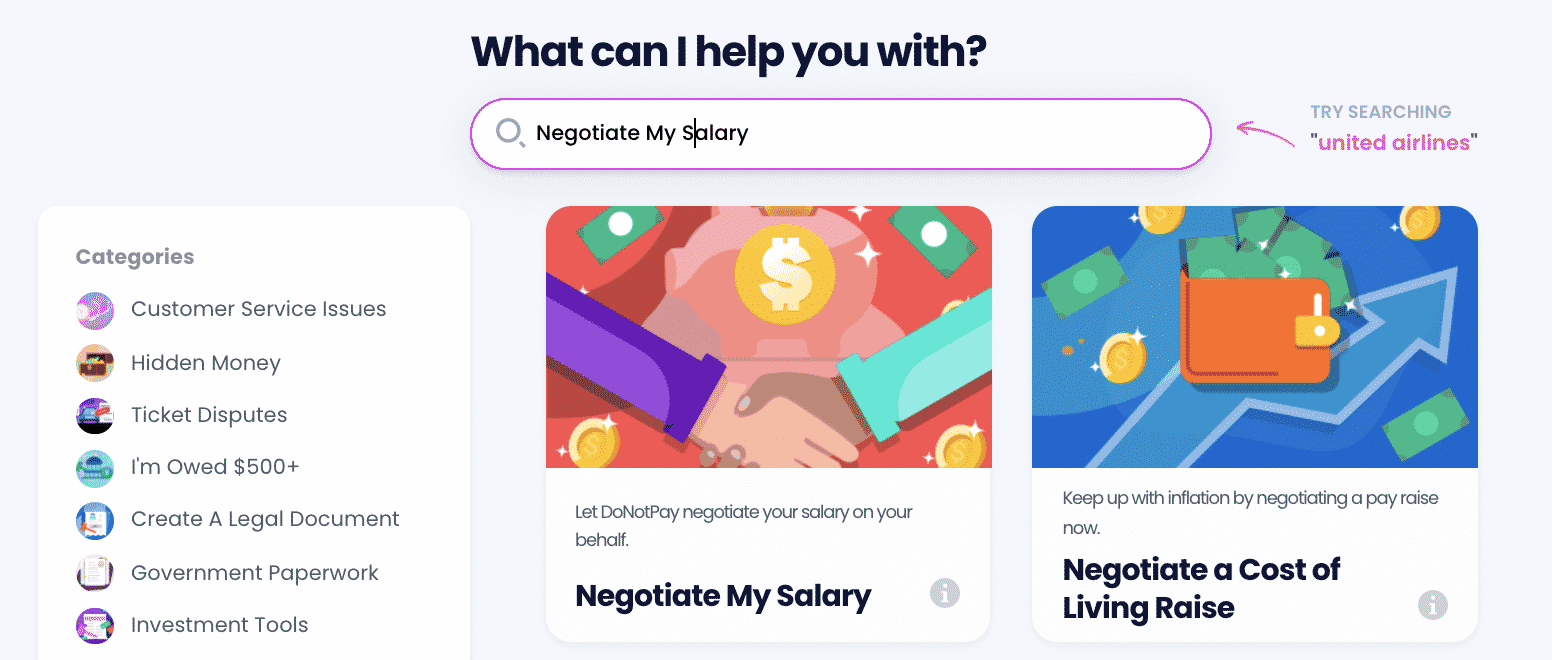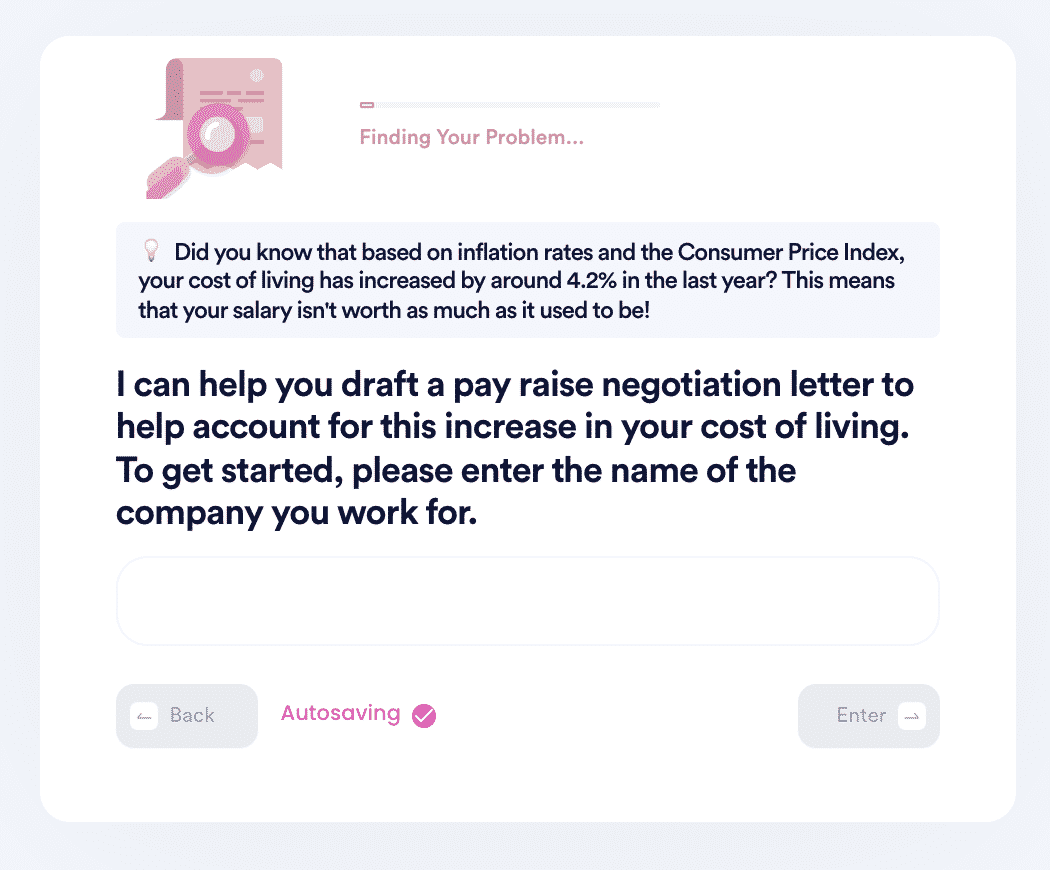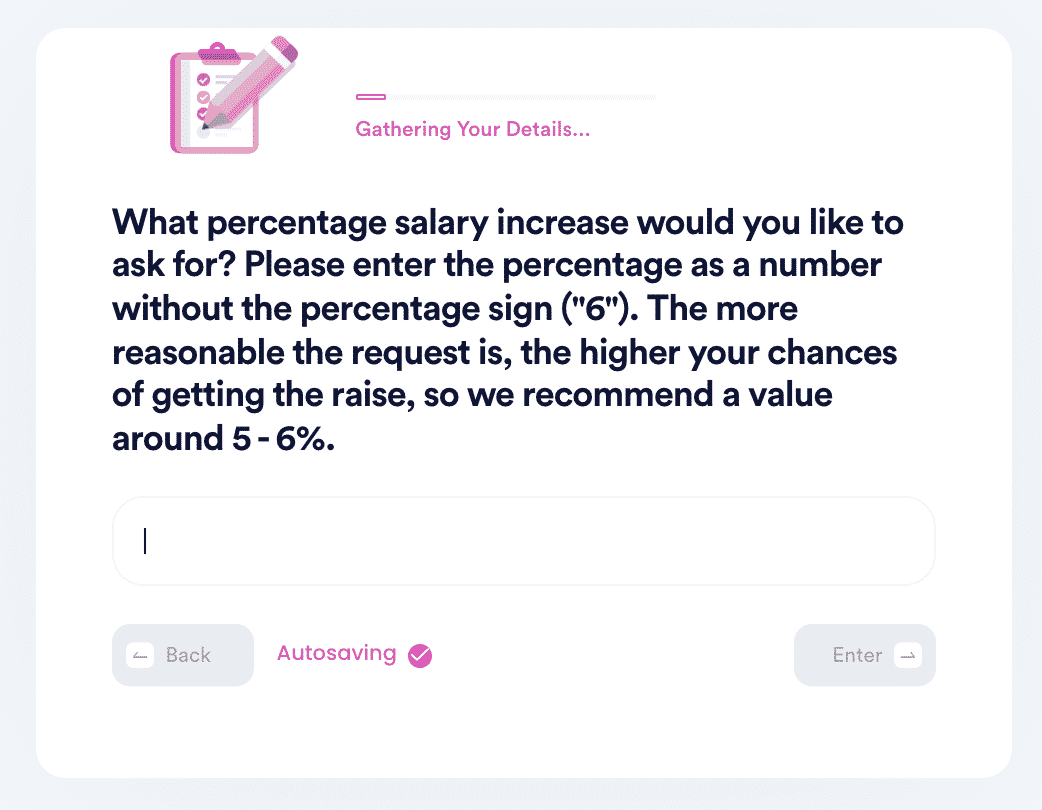How Much Salary Increase Should I Ask for a New Job
A new job can be an exciting step in your career. Whether it's a big promotion, you are looking for potential growth with a new company, or you simply need to boost your salary, landing a new position can mean an increase in your income. However, it's often up to you to negotiate that salary. should you expect in 2022? DoNotPay is here to help you understand how much of a raise to ask for, how to handle salary negotiation, and even help you navigate the process.
What's the Average Salary Increase When Changing Jobs?
Changing jobs usually results in higher wage increases than waiting for a pay raise in your current position, according to CNBC. The average wage gains for job switchers rose by up to 4.3%. For those who stayed in their jobs, average wage gains were approximately 3.2%. Of course, this will vary based on your industry, experience, and location.
Tips to Negotiate a Salary Increase
Whether it's a promotion with your or if it's time to negotiate a higher salary. Here are some tips to consider:
| What Do You Bring to the Table? | One of the most important considerations for requesting a raise is selling yourself. Consider your education and training. Even if your degree is standard in your industry, do you have additional certifications? How long have you worked in the industry? You can use special awards and contributions to successful projects as talking points. Referencing other job offers at the right time might make you look more appealing, and good leaders want the best and brightest with their company, not with their biggest competitors. |
| Know the Facts | When dealing with salary negotiations, be prepared with facts and statistics. This is the most effective way to determine you should expect. You don't want to sound like a robot, and you don't want to stand firm on a salary that is unrealistic for your experience and industry. Therefore, understanding the average salary for your position in your industry and for your location is important. You should also be prepared to discuss the increase in the consumer price index and inflation. The research side of this can be tedious and time-consuming, but it is imperative to be prepared with current information. |
| Discuss the Benefits Package | Benefits are part of your salary. Consider the type of paid time off that is offered, if bonuses are guaranteed or discretionary if they offer travel reimbursement or other incentives. Sometimes, negotiating benefits is just as important as negotiating salary. A raise that is negated by additional travel expenses is not beneficial to you - you want to make sure you cover all angles. |
How to Negotiate a Salary Increase for a New Job on Your Own
It can be a little intimidating to , but it is certainly within your right.
- Schedule a meeting or appointment with the human resources director or manager that is handling your interview/onboarding. You can schedule the appointment by email or phone. Technically, you can ask for a raise by email too, but in-person negotiations may work in your favor.
- Be prepared with the research you've done. You might want to have a mock conversation with a trusted friend or family member to go through your talking points. Bonus points if you do it with someone who has experience with salary negotiations. You don't want to sound overly rehearsed, but it can settle your nerves if you have the chance to go through it at least once.
- Enter your meeting prepared and confident, and let the negotiations begin. Remain calm and positive, and let your knowledge and experience speak for themselves.
Is There an Easier Way to Negotiate My Salary?
DoNotPay wants to take the time and stress out of negotiating a salary. Whether you want to request a raise with your current company or prepare for salary negotiations with a new company, we can do the market analysis and draft a compelling negotiation letter for you.
All you have to do is:
- Search “negotiate my salary” on DoNotPay.

- Enter the name of your company and the industry you work in, so we can find the right wage statistics for your role.

- Answer a series of questions regarding your qualifications and achievements, relocation expenses, and other job offers if applicable.

- Enter the new base salary you would like to request.

And that's it. Once the information is finalized, DoNotPay will generate an official salary negotiation letter that you can then email or present to your employer.
DoNoPay is
- Fast—You don't have to spend hours trying to decide how much of a raise you deserve.
- Easy—You don't have to struggle to research negotiation tips or appropriate salary increases for your new job.
- Successful—You can rest assured knowing we'll make the best case for you and get you the salary increase you deserve.
More Ways DoNotPay Can Help
In addition to helping you negotiate salary increases, DoNotPay can help you in a variety of other ways.
- Reduce Property Taxes
- Cancel Subscriptions
- Fight Workplace Discrimination
- Request Sick Leave
- Handle Chargebacks and Refunds
Whatever problem or concern you have, DoNotPay can help save time, money, and stress.
Frequently Asked Questions
How much should my salary go up when I get a new job in 2022?
The average range tends to hover around 5 to 10%. Of course, this number also depends on your industry, company, location, and other factors.
Should I switch jobs or wait for a raise in my current position?
Switching jobs typically means you will get a higher pay raise than if you stayed in your current position. The average pay increase by staying in your current position tends to be 2-3%, compared to 5-10% if you were to switch jobs.
How can I negotiate a salary increase when changing jobs?
You can get a larger salary increase by not disclosing your current salary, doing research on market rates, negotiating before accepting an offer, and tailoring your resume to get the job that best suits your skillset.


